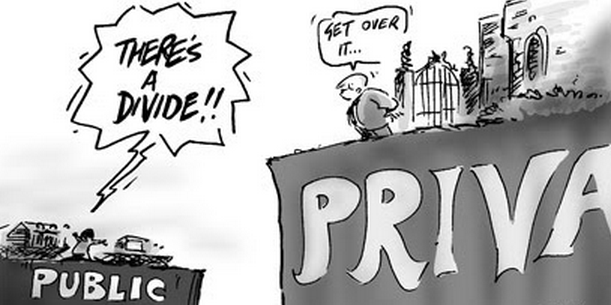Private VS Public Companies
Post on: 16 Март, 2015 No Comment

Valuation Articles
Private vs. public companies
The New York Stock Exchange and other public markets provide readily available, objective pricing information. Therefore, valuators routinely rely on public stock market data when valuing private businesses.
Are they comparable? - For instance, the guideline-public-company method bases a private company’s value on the stock prices of similar public companies. Alternatively, when employing a discounted-cash-flow analysis, a valuator uses public stock returns as the foundation for a private company’s cost of capital.
Comparisons between public and private entities often have limitations and may require subjective adjustments to bridge the gap.
Keep in mind that the use of public stock market data generally results in a minority, marketable value. When using public market data to estimate a controlling interest in a private company, the valuator should consider other subjective adjustments, such as control premiums and (possibly) illiquidity/marketability discounts.
Sources of discrepancy - Although numerous exceptions exist, as a general rule, public companies trade at higher price multiples (or, conversely, pay investors lower percentage returns) than their private counterparts.
One primary reason for this discrepancy can be summed up in a single word: risk. Private companies are riskier than public companies for several reasons. Public companies generally have greater resources, more professional management, more stringent regulatory oversight and more diversified product offerings than private companies. Public markets also provide greater liquidity — or opportunities to trade securities issued by the company — which investors desire.
Another reason for the multiple discrepancy relates to management’s objective in reporting income. When private companies record profits, management’s primary objective is often to minimize income taxes.
Conversely, public companies maximize their reported earnings per share to please analysts and investors. This philosophical dichotomy naturally deflates private company price multiples.
Possible strategies - Nearly every valuation relies on public market data to some extent. Although public market data is a key part of valuation science, valuators and attorneys need to understand its limitations.
Valuators can bridge the gap between private and public company values in several ways. For example, they can consider adjusting income streams and price multiples to ensure that their analyses compare apples to apples.
Valuators may also need to apply valuation discounts or consider supplementing their analyses with other sources of information, such as industry rules of thumb or private transaction databases.
Sidebar: Valuations are not just for private businesses

Finding a stock price for a public company may seem like a no-brainer — just open the Wall Street Journal or visit Morningstar’s Web site and, voila, you’ve got it.
But public companies (and their investors) occasionally require valuation advice, too. Here are some common reasons valuators are hired to appraise public companies:
Mergers and acquisitions - Although a public company’s price per share is easily attainable, the entire company’s value often exceeds its market capitalization. For instance, a strategic buyer may be willing to pay a premium to gain market share or to achieve synergies.
Bankruptcy filings - Financially distressed companies often use valuation experts during the bankruptcy process. Valuators can assess turnaround plans or identify potential spin-offs. And if a creditor claims that a public company made a fraudulent conveyance, the board may hire a valuator to provide a solvency opinion.
Fairness opinions - In light of recent accounting scandals, many boards obtain a fairness opinion before embarking on large (or controversial) transactions. A fairness opinion helps the board demonstrate that directors acted on an informed basis, in good faith, in a manner consistent with the investors’ best interests, and without fraud or self-dealing.
Accounting compliance - The Financial Accounting Standards Board (FASB) sometimes requires public companies to use valuators when preparing their financial statements. For instance, public companies (as well as private companies) need appraisers to value acquired intangible assets (under Statement No. 141, Business Combinations ) and to test for goodwill impairment (under Statement No. 142, Goodwill and Other Intangible Assets ).
In accordance with the Sarbanes-Oxley Act and stricter AICPA independence rules, public companies must now hire an outside valuation firm — independent of their audit firm — to perform these valuation services.














